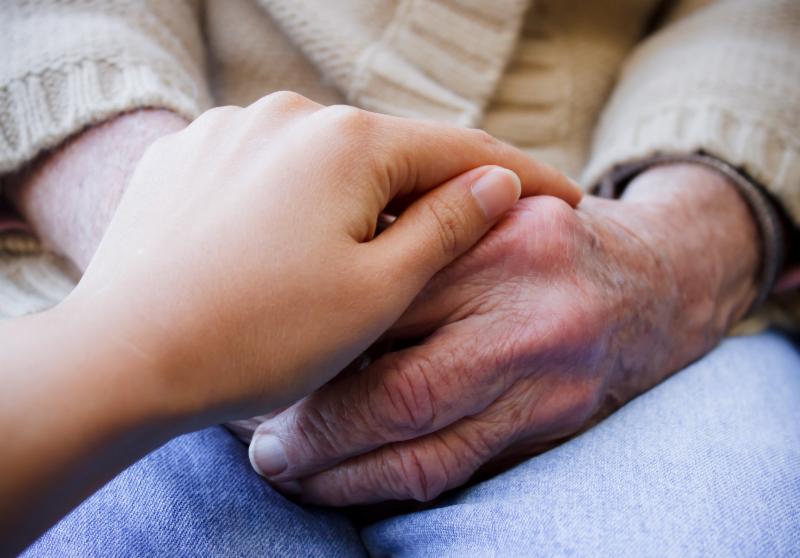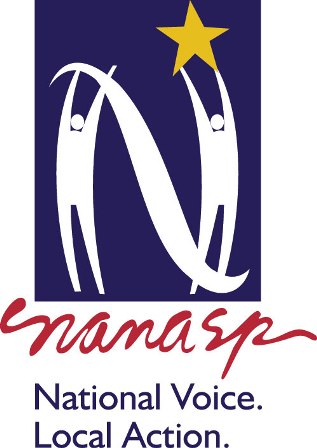 |
NANASP NEWS
November 18, 2016
Raising Awareness of the Risks of Malnutrition to Both Family Caregivers and Their Loved Ones

Social Media Sharing
Tips during
National Family Caregivers Month
In the United States, family caregivers are increasingly responsible for providing nutrition to older adults, including those with long-term chronic conditions. Because caregiving can be highly stressful, both the caregiver and the loved one for whom they care can be at risk for nutritional issues, including malnutrition.
More awareness is needed to ensure that caregivers take good care of their own nutrition as well as their loved one's - and that they know the signs and symptoms of malnutrition to protect them both from its negative health implications. The National Family Caregivers Month of November provides an excellent opportunity to highlight the important connection between family caregivers and good nutrition through social media sharing.
HOW TO PARTICIPATE:
For your convenience, the next section includes sample social media content you can simply copy, paste, customize and share!
Social Media Sample Content:
Sample Twitter, Facebook, Instagram Posts:
- [<Your Organization name> is] proud to support National Family Caregivers Month #TakeCare2GiveCare #NFCMonth #Caregivers
- Have questions about caring for your loved one? Get tips for caregiving from @CaregiverAction #TakeCare2GiveCare #NFCMonth #Caregivers
- During #NFCMonth take time to make sure the caregivers and loved ones in your life are getting proper nutrition. #malnutrition
- Caregiving can be stressful. Support yourself with good nutrition and guard against #malnutrition. #NFCMonth
- Caregivers: take care of yourself and your loved one by eating well and knowing the signs of #malnutrition #NFCMonth
- Emotional stress can impact the nutrition status of family #caregivers. Nourish yourself and watch for #malnutrition. #NFCMonth
- November may be a "season of plenty" but many older adults don't have access to groceries and healthy food options. #NFCMonth
- During #NFCMonth familiarize yourself w/ the causes, signs, & solutions to help your loved ones avoid #malnutrition http://bit.ly/2fwBWTi
Sample Facebook Posts (too long for Twitter):
- [[We are] [<Organization name> is] proud to support National Family Caregivers Month. If you are a family caregiver, remember that you need to Take Care to Give Care! http://caregiveraction.org/national-family-caregivers-month
- We are proud to support National Family Caregivers Month. Emotional stress can have a negative impact on a caregiver's nutrition status. Take time this month to assess the nutrition status of yourself and your loved ones and guard against malnutrition.
- We are proud to support National Family Caregivers Month! During this time, please review the Causes, Signs, and Solutions to help your loved ones and prevent them from facing malnutrition. http://blog.caregiverpartnership.com/2011/03/malnutrition-in-elderly.html
Caregiving Facts:
- Caregivers are a diverse group: they come from every age, gender, race/ethnicity and socioeconomic status.
- 7% of the caregivers are age 75 years or older - typically a 79-year old female, providing care for an adult 34 hours a week without any other unpaid help. She has provided care for 5.6 years.
- She is usually caring for her 77-year old male spouse, with Alzheimer's, "old age" or heart disease.
- 6 in 10 caregivers care for an adult with a long-term chronic condition.
Caregiving and Malnutrition:
Older adults who are malnourished may suffer from unsafe weight loss, feel exceptionally fatigued, suffer from depression, experience memory loss, or have a compromised immune system.
Causes
- Malnutrition can be caused by social and psychological factors as well as physical. If your loved one has little social contact, he or she may not enjoy cooking or eating meals. If he or she is living on a limited income, he or she may have trouble affording groceries, especially fresh, health foods.
- Seniors suffering from dementia may simply forget to eat.
- Diminished appetite is also caused by illness, trouble eating, some medications, and diminished taste and smell. Dietary restrictions that are often put on older adults can also make the food seem tasteless and unappealing. Over-the-counter and prescription drugs can affect appetite, digestion and how nutrients are absorbed.
Signs
- Malnutrition will eventually manifest itself in physical signs: Have you noticed your loved one's clothes fitting more loosely? Is he or she experiencing dental problems? Does he or she bruise easily? Do wounds take longer than normal to heal?
Solutions
- Buy fresh, whole foods whenever possible.
- Shop for tools that encourage independence in the kitchen.
- Add flavor to foods using herbs, spices, salt-free blends and lemon juice.
- Encourage snacking and have nutritious snacks available around the house.
- Make meals more social
- Help with grocery savings and meal planning
|
| __________________________
|
|
NANASP Annual Conference - Save the Date
June 14-15, 2017 * The Hyatt Lodge * Oak Brook, IL

2017 Joint Conference Call for Presentations
Click Here for more information
|
Have an article you would like to have published in
NANASP NEWS? Want to see your organization featured in
NANASP Member Profile?
|

National Association of Nutrition and Aging Services Programs
1612 K Street NW, Suite 400
Washington, DC 20006
|
|
|
|